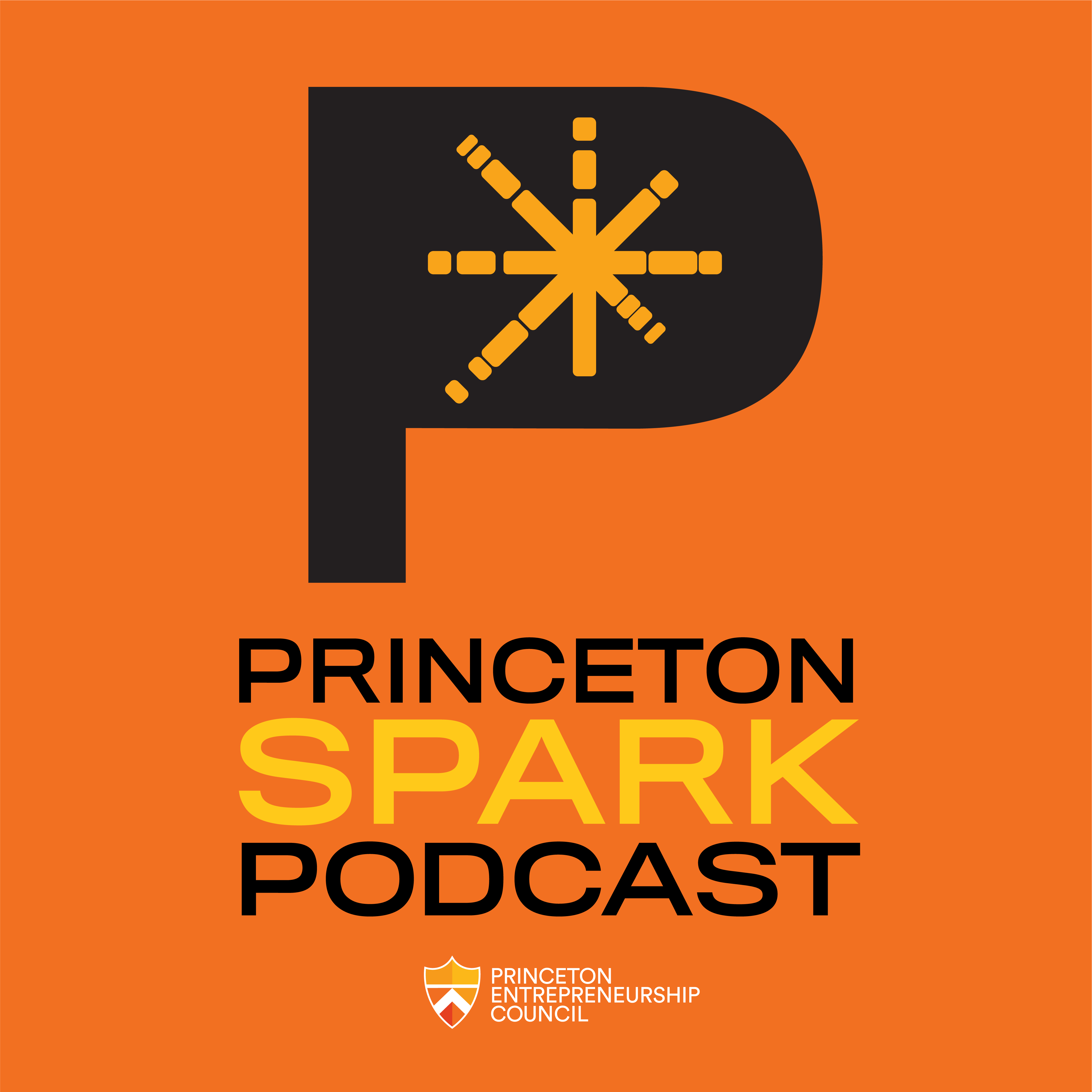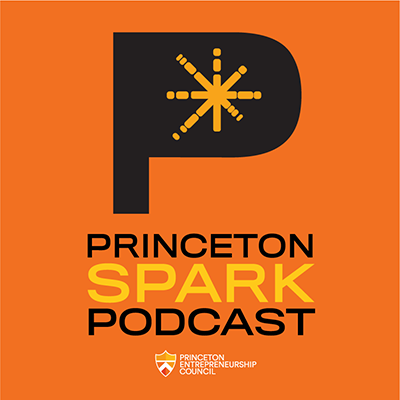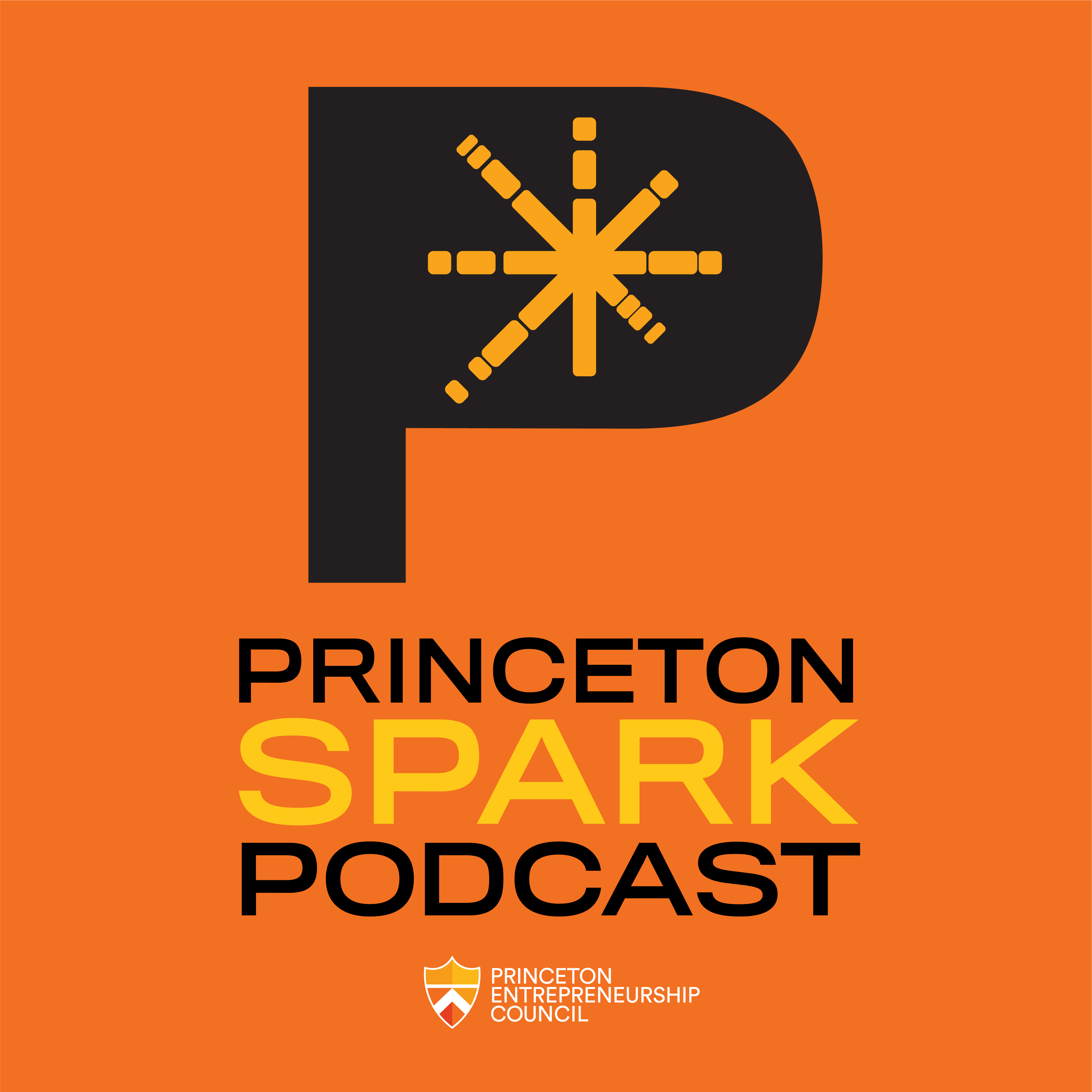Episode 002 - Thriving Under Uncertainty
Description
Thriving Under Uncertainty with Brooks Powell '17 and Pilar Castro-Kiltz '10
SHOW NOTES:
Watch Brooks Powell pitch at Shark Tank. Find alcohol-related health from Cheers at cheershealth.com.
Learn more about Princeton Arts Alumni and their "Alumni in the Arts" programming.
Learn more about More Canvas Consulting: Business Management for the Arts.
CREDITS:
Produced by the Princeton Entrepreneurship Council. Music by Wright Seneres. Theme music by the Treadmills (Wright Seneres, electric guitar and electric bass; John Damond, Jr., drums). Engineered by Dan Kearns and Dan Quiyu at the Princeton Broadcast Center. Edited and mixed by Wright Seneres. Promotional readings by Megan Donahey '20.
TRANSCRIPT:
From the Princeton Entrepreneurship Council, this is the Princeton Spark. I’m Wright Seneres.
The various people that make up the Princeton entrepreneurial and innovation ecosystem have long been at work, taking risks to bring transformational ideas and companies to the world, in the Nation’s Service and the Service of Humanity. These are the stories of Entrepreneurship the Princeton Way.
At PEC, we support Princeton-connected startups and help to build the regional entrepreneurial ecosystem in New Jersey and beyond.
In our series opening three episodes, we are exploring three important aspects of entrepreneurship. If you haven’t heard the first episode on taking risks, it is available now at princetonspark.com or wherever you get your podcasts, so do check that out.
The very nature of entrepreneurship is doing something new and innovative, and so there is always some uncertainty involved. Navigating this uncertainty is something all entrepreneurs need to do if they want to thrive. So how do they do this? For one answer, we turned to Brooks Powell.
Brooks is the founder of Cheers Health, which used to be called Thrive Plus. So in an episode on thriving, I thought I’d go to an expert.
My name is Brooks Powell. I graduated from Princeton in the class of 2017. And I founded a company called Cheers, which we like to call an alcohol related health company.
I came across an article that just been published in 2012. I was reading this a few months after it being published, titled "Dihydromyricetin as a novel anti-intoxication medication". And in this article, they showed that DHM, which is a chemical extract, like caffeine to coffee, or THC is marijuana, is basically the active ingredient that makes the plant work. Well, basically, in Asian countries, people will steep this leaf in hot water and drink it after consuming alcohol. And evidently, it made them feel better in the moment. And then it also made them feel better the next day. A team at UCLA, they took that, they took the chemical extract, dihydromyricetin, injected it into rats, and they found that they can instantly sober up rats. They can prevent rats from becoming alcoholics. They can cure alcoholism and rats and oh, yeah, rats given DHM show no sign of hangovers. Basically, I took this study, I found it really compelling. I brought it straight to my neuroscience professor, he thought it was compelling. He scrapped the planned class lecture and lectured on this instead. Within a month or so all of my sort of post graduation career ideas, and totally transformed to me basically thinking, you know what, I'm gonna try to start a company off of this dihydromyricetin.
Starting an alcohol related health company is sure to have much uncertainty around it.
I think our uncertainty is really sort of related to the market that we're in. So, you know, there's never really been this concern that, could we make a working product? Would we be able to figure out the supply chain, etc, especially hardware companies, and they fail all the time, because it's just so hard to build a hardware company, such as, like Ring doorbells successfully accomplished. For us, the challenge was, was this idea of, could you actually raise money for something that is alcohol-related. You know, would you be able to employ people on something that is alcohol-related? And the reason is, is that specifically for the VC community, you know, VC, you always think of VCs, as the investors, the people that give other people money, but VCs really have to deal with people called limited partners, which are universities, like Princeton, or state pension funds, or high net worth individuals, and some LPs are having to raise money every five years. So our sorry, venture capitalists are having to raise money from LPs every five years or so. Meaning that every investment they make, they don't want some LP looking at it going like, "Well, why did you invest in that company?" So for the longest time, as we're sort of building this company, you know, we would have 50 conversations with VP and 60, or 70% of them, who wouldn't really want to take past the first meeting, primarily because they didn't know what their LPs would think of them investing in something that might be able to be characterized as a hangover cure. And so that was one of the things that we really sort of the uncertainty of, we knew that that sort of category of alcohol related health was going to become a thing because we were going to make it a thing. But you still have to convince other people, the sort of gatekeepers the funding, that is going to become a good thing. And 10 years from now, everyone's going to look back and go, Oh, alcohol related health category makes so much sense. Just like the immunity section of supplements of the supplement aisle, or the sleep section of the vitamin supplement aisle, or the vitamin C section of the vitamin and supplement aisle, right? Soon, there'll be sort of be an alcohol related health section. And there's sort of that uncertainty like, "Could we grow the company big enough where we can start getting funding from these institutional partners? Or, you know, would we ever be able to sort of get funding from these institutional partners?"
Through this uncertainty, Brooks’s startup is thriving. They raised a $1.2 million seed round in 2018. And they brought a very thoughtful and well-researched effort on a major rebranding to their investors. The result of which? Say hello to Cheers.
To put it lightly, the consumption of alcohol has its good and bad sides. Even though Cheers’s customers call it a hangover cure, Brooks is careful to use other nomenclature. It’s a long explanation and it involves the federal Food and Drug Administration, but the end result is they are a dietary supplement in the eyes of the FDA.
For us, we have to leave it a bit vague. We have to say, “after alcohol aid”, you know? Feel better. Support your liver. But that enough is enough for consumers to come to their own conclusions about the products.
In 2018, Brooks appeared on ABC’s popular television program Shark Tank, in which entrepreneurs pitch in front of a panel of investors, led by Mark Cuban. Just to get to that point might have been harder than even getting into Princeton. After the break, he’ll tell us about it.
Welcome back to the Princeton Spark. When we left off, Brooks was about to pitch to the sharks on Shark Tank, but just getting into the TV studio was a very uncertain process.
Every year, every season, there's about 90 companies that get on the Shark Tank. So they'll do about 25 episodes, sometimes it's about 20 episodes. And they usually have three to four companies per episode, right, little 10 minute segments. But they also have the press release and that says, that every year, there's somewhere between 35 and 55,000 people or companies that have applied to Shark Tank. So doing the math on that, it's about 20 times harder to get on the Shark Tank than it is to get into Princeton. Which Princeton is already very hard to get into. You know, people that apply to Princeton usually have a shot to get in, but it's sort of self selecting. But it's still it's still a pretty peculiar fact. The other thing, I think people don't sort of know about Shark Tank, which really how long the casting process for them to go from 35 to 55,000 applications each year, it's actually getting on the show, it takes, you know, six to nine months of casting. So you have to go through all of these different rounds and different steps, some of its written, some of it is video pitches. And then finally, they get to California, they have the pitch in front of them live and answer questions. And, you know, there's a lot that happens before you actually get onto the stage. But despite all of that sort of being such a fine-tuned machine, When you get out on stage, what you see is what you get.
However, Mark Cuban traditionally does not put dietary supplements on the show.
Basically, what ended up happening for us is Mark Cuban traditionally just hates dietary supplements. Because the truth is, in the dietary supplement industry, more stuff doesn't work than works. Right? And so Mark Cuban's point of view is, you know, we don't want to bring anything onto the show that could be deceptive towards consumers. Right? So if you actually watch the episode, that's why he's asking so many questions about science.
Originally, the producers didn't want to let me and Thrive+ on the show, because they're like, "Yeah, it's just going to make Mark Cuban mad, he's going to make it bad TV. So what I did is I actually wrote the producers this 15 page, back and forth Q&A. If Mark says this, I'l










